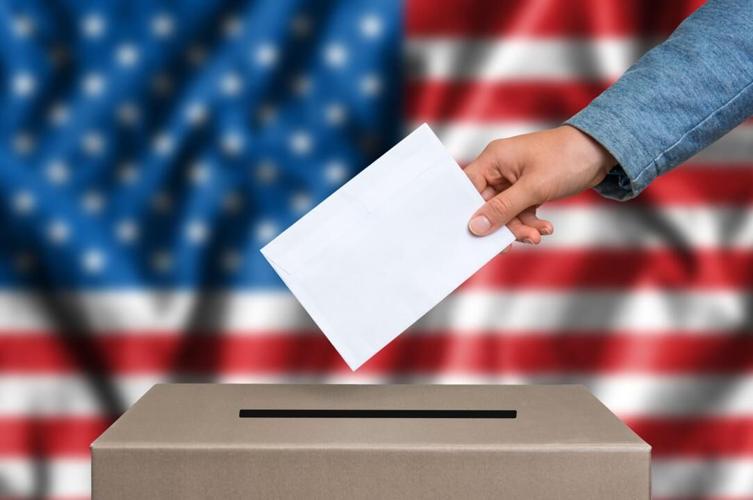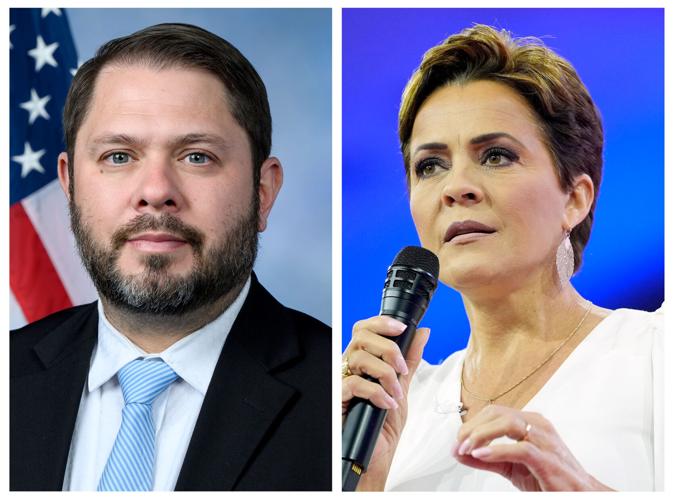PHOENIX — Democrat Ruben Gallego is amassing a financial war chest in anticipation of an eventual general election contest for U.S. Senate against Republican Kari Lake.
And incumbent Arizona Gov. Katie Hobbs, not running for anything this year, has managed to spend more than $1.3 million since the last election.
New campaign finance reports suggest that Arizonans are going to be inundated with lots of commercials, signs and campaign materials, with hotly contested races up and down the ballot. And that doesn’t include the money that Joe Biden and Donald Trump are likely to spend here to pickup the 11 electoral votes in what has become a swing state.
And then there are the hot-button ballot issues, ranging from abortion to border security.
All in all, AdImpact which tracks such things, predicts that, when all is said and done, $821 million will be spent in Arizona on political advertising.
Presidential politics aside, the biggest candidate spending statewide is shaping up to be the race to replace Kyrsten Sinema in the Senate. The former Democrat became a political independent before quitting, a move that cleared the field — at least on that side of the political spectrum — for Gallego to be the Democratic nominee.
So far this campaign he has collected nearly $30.6 million, including more than $9.4 million this past quarter alone. And while Gallego spent nearly $10.9 million in the past three months, he is raising it fast enough so that he still has more than $9.2 million in the bank — just slightly below where he was at the end of March.
Lake does have a primary against Pinal County Sheriff Mark Lamb, though she spends most of her time, effort and finances campaigning against Gallego. But Lake trails Gallego by a wide margin in fundraising.
She took in less than $4.4 million in the last quarter, bringing her total fundraising for the race to just above $10 million. But she also spent more than $4 million during the same period, leaving her with about $2.8 million cash on hand.
By contrast, Lamb has collected just slightly more than $2 million in the whole campaign, spent $1.7 million of that, with less than $264,000 in the bank.
Someone who does have some money to spend is Hobbs.
The incumbent governor has the benefit of having collected nearly $3.4 million since she filed her final 2022 campaign finance report. So, even with her expenditures since then, she still has $2.5 million in the bank.
Hobbs has told Capitol Media Services she wants to use some of her cash to help elect Democrats to the House and Senate this year. But she hasn’t said how much she intends to use — versus save for her own 2026 campaign — and there is no indication so far of money already having left her own account to spend on other races.
So how does someone not running for anything manage to spend money?
Much of it involves the cost of raising it in the first place.
For example, Act Blue, which is a clearinghouse that Democrats can use to process donations, charges a fee. Hobbs reports she has so far paid it more than $76,000.
Then there’s another $173,000 for consultants, about $100,000 for software, $72,000 for mailing expenses and more than $95,000 for office rent.
Several of the congressional races are shaping up to be expensive affairs.
Republican Juan Ciscomani in his bid for reelection in CD 6 in southern Arizona has collected nearly $4.4 million with almost $2.9 million left to spend.
Kathleen Winn, his foe in the GOP primary, has less than $43,000 available.
The winner will face off against Democrat Kirsten Engel. Without a primary foe, she has more than $3.1 million cash on hand.
There are some high-profile primaries shaping up for the state Legislature.
One of the closest watched will be in LD 17, largely in northern Pima and southern Pinal county, where Republican Vince Leach is trying to win back the Senate seat he lost two years ago to Justine Wadsack.
He has collected more than her and has about three times as much cash on hand and is getting a bit of help from Term Limits Action Arizona.
But Wadsack is getting outside help of her own from a group called Make Liberty Win in Arizona which promotes itself as trying to elect 250 “liberty-defending state legislators” across the country. State law allows independent expenditures as long as donors do not coordinate with candidates.
That same group also is putting cash into preserving the seats of incumbents Rachel Jones and Cory McGarr, the two Republicans seeking reelection in that district for the state House who are trying to stave off a challenge from Anna Orth. And Republican Mike Hudelson, running for a House seat from LD 16, also is a beneficiary of Make Liberty Win Arizona.
One closely watched race is in LD 1 where incumbent Sen. Ken Benett faces a challenge not only from Mark Finchem, the failed 2022 candidate for secretary of state who also used to represent the Oro Valley area in the state Legislature but has since moved to Prescott. Also trying to oust Bennett is Steve Zipperman who has more cash on hand than either of them.
And in LD 7, current Rep. David Cook is seeking to unseat incumbent Sen. Wendy Rogers who is better funded. But she faces financial headwind with an independent expenditure against her of more than $260,000 by Arizona First.
With Cook trying to move to the Senate, that has created an open House seat in the district. Incumbent Davide Marshall Sr. is seeking to be one of the two GOP nominees. But former Reps. Walt Blackman and John Fillmore also both want back into the Legislature.
It isn’t just among Republicans where primaries are shaping up. Briana Ortega is trying to unseat either Consuelo Hernandez or Stephanie Stahl Hamilton, both Democratic incumbents who occupy the two House seats in LD 21.





